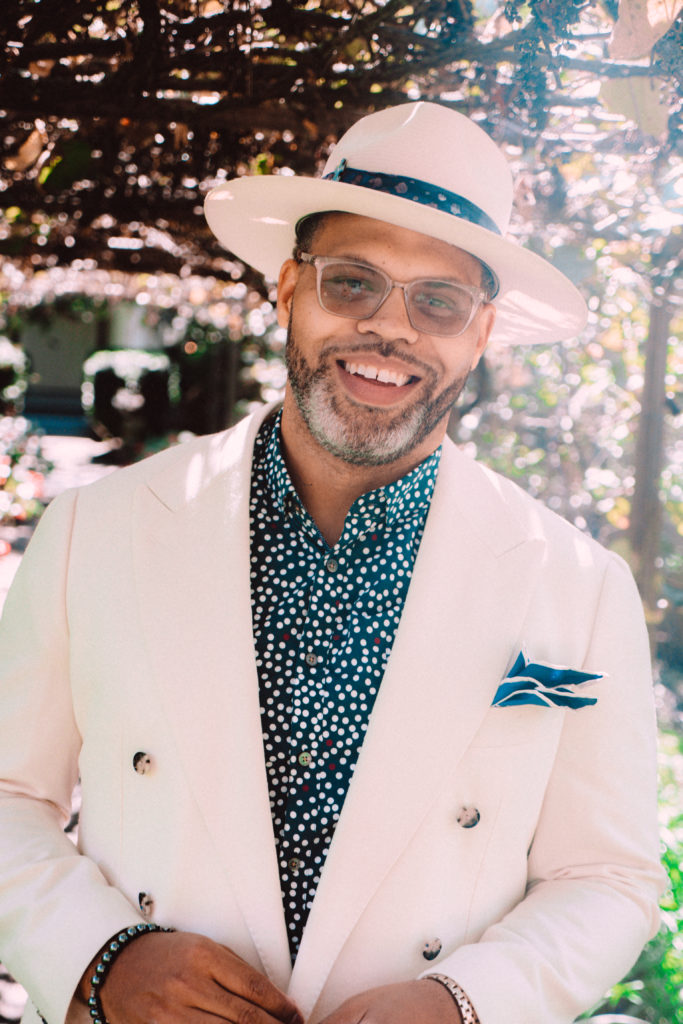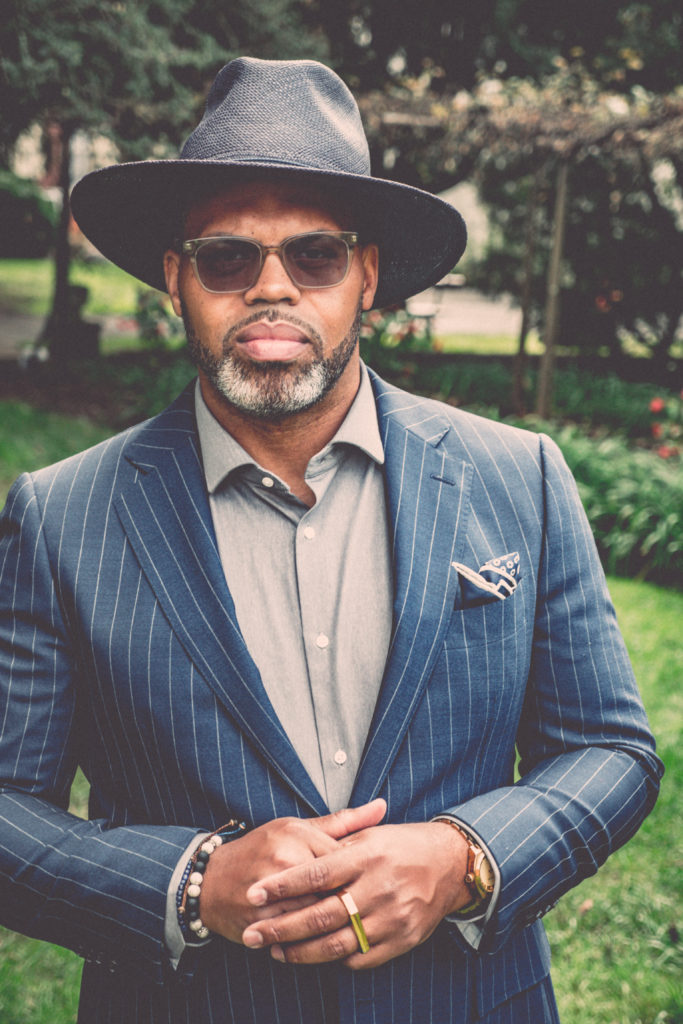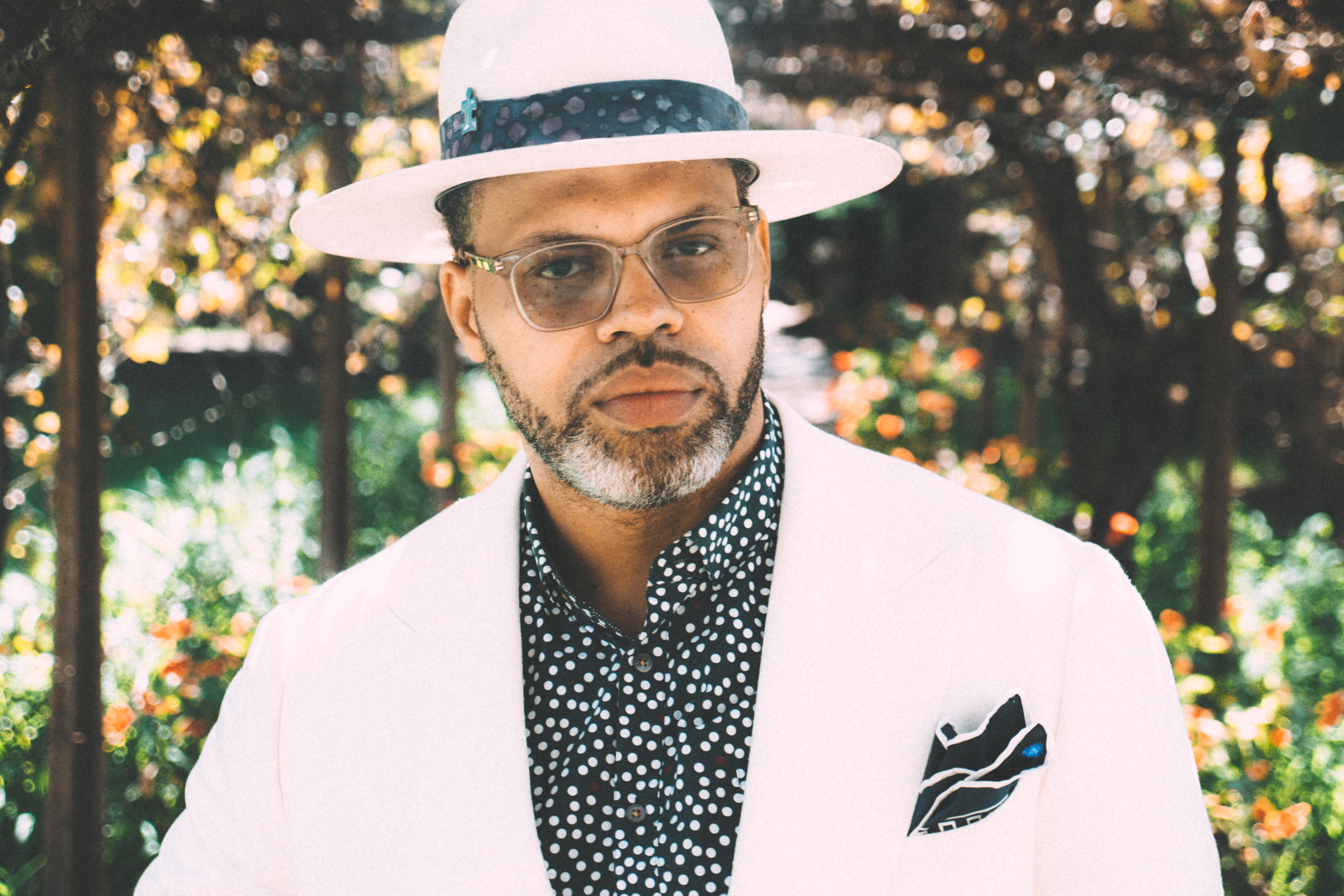Interview: Eric Roberson on Allyship
Posted on February 28, 2022
Creative / Education / Events / From The Studio / Nonprofit / Uncategorized
Eric Roberson (aka Erro), owner of the Blue Erro Soul record label, is often described as the pioneer of the indie movement in R&B/Soul. Having been nominated for multiple GRAMMYs, the New Jersey-based songwriter and producer has collaborated with artists such as DJ Jazzy Jeff, Jill Scott, Musiq Soulchild, Dwele, and Vivian Green, in addition to his work as a solo artist with 13 albums under his belt.
Outside of the studio, Roberson is a professor at Berklee College of Music in Boston, teaching songwriting and music business. A strong advocate for contagious positivity, Roberson believes in leading by example and always trying to leave a room better than it was before he got there. “Be what you need,” he told us, is one of the many credos he lives by.
Roberson recently sat down for a livestream interview with Gender Amplified founder Ebonie Smith to talk about his work as a producer, as well as his support for the Gender Amplified initiative and the importance of male allyship in the fight for equality in the music industry and beyond. The following is a combination of excerpts from that conversation as well as a follow up phone conversation with Roberson a few weeks later. Read on for Roberson’s thoughts on being an ally, battling imposter syndrome, and making the recording studio a more inclusive environment.

Gender Amplified: What is your definition of allyship for the people who are joining us? How do you define it?
Eric Roberson: I define it by making sure you’re investing in the betterment of all things…if we don’t support each other—if I don’t support the women in the industry—the industry suffers. The music suffers…It’s not like, “Oh, you’re a woman who does music? I got to make sure I support!” It’s like, “You’re just dope, come on in.”…It should not be rare that we have a female mix engineer…I’m honored that I’ve written checks to female producers who produce on my albums before, and not because it’s a thing that you brag about, like, “hey, guess what I did for the allyship?” But it’s just, if it’s dope, just let it be dope, and embrace it…as much as you can make that contagious so that we all as a whole kind of act that way, and carry ourselves that way and treat it that way, to me is the is the real definition of allyship. So that we all can work, we all can flourish and continue to build towards the betterment of the industry as a whole.
Gender Amplified: What does that look like to you, if it’s actualized? What’s the vision that you would like to see achieved there?
Eric Roberson: Let’s even start from a business standpoint. I think fairness is important…The lack of credits towards whoever did work, this ridiculous unfairness in sharing royalties once things are worked on…to me, the betterment is like, can we get to a fair level, to where people are seen for what they do?
At the same time, just really realizing that art is an act of service, and you’re doing a disservice if you don’t make the best art you possibly can. And, if you’re not encouraging everyone to expand to the level they need to expand to, there’s no way we’re getting this art to where it can go. If you’re discouraging someone from pursuing production, if you’re discouraging somebody from pursuing engineering, you’re removing better engineers and better producers and better musicians.
Let’s acknowledge the magic that is there no matter who did it…for me, I’m looking for whoever takes my breath away: male, female, or other… so as much as we can level the playing field, as much as we can encourage everyone to take their shot, the more we’re going to get our breath taken away, the more we’re going to get those goosebumps that we chase after. Then the better the music, and the music industry will become.
Gender Amplified: I want to talk about imposter syndrome. Even years into a career, it doesn’t always go away. And then some people have it much more than others because, in addition to personal insecurity, they’ve got all of these micro and macro aggressions and marginalization fighting against them. I’ve certainly experienced that. What is your philosophy for fighting through that?
Eric Roberson: So we all need to take a minute—and I’ve done this, I’ve done the homework, I’m not just throwing this out there. We all have to take a minute and address our relationship with certain things. Address your relationship with doubt. Address your relationship with imposter syndrome. Address your relationship with creativity. You have to treat it like it’s an actual part of you, or you have to treat it like it’s an actual person. You’ll be more open to stopping a person who is stopping your dream. But yet, you will allow something in you to stop you. So you’ll allow doubt to sink in, but you wouldn’t let someone walk in the studio and talk down to you while you’re working.
Address the relationship that you have with it first, so that you can figure out how you can fight. Because you have got to fight it. You have this voice in you that’s talking you out of this, that’s belittling you, that is holding you back from getting to the point you’re trying to get to. I encourage therapy, I encourage finding the support system amongst your friends who know how to speak to you to get you out of certain funks…Imposter syndrome or doubt is just like cholesterol; it’s going to be there, but you’ve just got to lower the levels…I struggled with doubt just as much as anyone else did. I had to really address the certain things that were holding me back. For me, it might not have been imposter syndrome, but understanding what I wanted, understanding what success meant to me. Not defining it for myself really held me back early in my career, because I spent so much time chasing stuff that didn’t matter.
Gender Amplified: What advice would you give to male peers on creating an inclusive environment, specifically in the studio?
Eric Roberson: Man, the first thing I would say is just do better. And I even speak for myself. Just do better. We are such jerks. Mind you, I speak from a place where I haven’t been the worst person. I can go on confidently saying that I never made someone feel uncomfortable, but was I the best person in the studio? Was I the most encouraging? No. I learned that I had to do better. And each day that I try to create and try to work, I try to do better and try to encourage. I think it was a big eye opener for me when I started teaching at Berklee…I don’t think I was that aware of how discouraging men were to female producers and female musicians until I spoke to a lot of my students, and they were like, “I feel like I got talked down to through this entire time at Berklee.” That was a big eye opener for me. I knew it existed. I didn’t know it was that heavy. So I would say do better first and foremost. If you feel like somebody is not speaking to someone right in a studio…if someone’s talking down to someone, especially a female, do better. Speak up. Do not allow that to happen. Change the temperature of the room, and say, “Hey, we’re not accepting that here.” Especially if you hold a level of seniority, you can’t let anything happen like that on your watch. The positive things that you stand for have to become contagious amongst whoever is around you.
Do better and lead by example. You know what’s best, and you choose not to do it. This is selfishness and ignorance that’s not helpful. It’s not making you a better person. It’s not making those around you a better person, and it’s not making the music better. Make sure that if you’re working with a certain number of songwriters, make sure that there are some female songwriters, and if you work with certain musicians or producers or engineers, make sure that you’re giving an opportunity and a shot to a female just like the one you’re giving to the male. Recognize if you are being a little one-sided.
Gender Amplified: How has being a father and a husband affected how you understand allyship and how that plays out in what you do?
Eric Roberson: You have to have that in a marriage for it to work, and my wife is a very busy businessperson as well as I am. There’s plenty of times that I will stop what I’m doing to support what she’s doing. And vice versa…for us to grow…there has to be that allyship just in the home. And I think it’s important for our kids to see that. One of the most valuable lessons I had, as a kid growing up, was watching my mother quit corporate America to start her business in fashion…the very next step was watching my dad take his brand new Lincoln Mark VII and put a “For Sale” sign up on it, and sell it to buy a van to help support her fashion career. And that, to me, was allyship. So that was an impactful thing and…a valuable lesson for me as to how to be, and I want to show my kids—I have three boys, I don’t have any girls—I want them to witness that I’m never too busy to support your mom, I’m never too busy to check in and…that will speak further on how they will treat their partners in the future.

Gender Amplified: You had a very strong role model in your father when it comes to sacrificing for a partner and being an ally in general. For those who don’t have a strong role model in their lives, do you have any literature or other sources to look for guidance?
Eric Roberson: That’s a great question. Malcolm Gladwell‘s book Outliers was a great book for me in helping me understand why certain things worked out and why certain things didn’t…I’m reading a book right now called Principles by Roy [Dalio]. He’s not a role model, but there’s some solid principles in there that I think are very, very helpful to what we do…For those who don’t have the proper role models, or don’t have the proper circle, it is alright to reinvent your circle. It’s alright to find who you need.
There is a woman named Dyana Williams. She’s a legend in the industry, and she’s worn hats every way you can think of. But I remember meeting her probably 25 years ago, and walking up to her going, “I feel like you’re somebody I should know. I’d like to exchange information.” I was singing background for an artist named Malik Pendleton, and she was doing PR for him. And to this day, she’s still like a mentor to me. She’s still someone that I talk to, someone I collaborate with, someone I call and get advice from, and dare I say might give advice to in certain ways now. We celebrate something. But when I went to her, I had nothing. I had no money to hire her. I had no credentials or history or track record, but I knew she was important and that I would need her.
At the same time, I remember when I was heavy into songwriting, and I would go up to New York every two weeks—this is probably late ‘90s. And I would go to Epic or Virgin or Sony or Warner Brothers. And those meetings at times could be really brutal. Like some of the worst moments I’ve ever felt in my life came out of those meetings, but I had to go on going to them. But I remember one time I took a meeting at ASCAP. I took a meeting with Bill Brown, and I left that meeting feeling better about what I was doing. So after a couple of weeks of taking bad meetings, I would schedule a meeting with Bill Brown before I left New York…What I was doing was guaranteeing that when I got on that trip to go back to Jersey, I would feel a little bit better about what I was doing. Because I couldn’t guarantee I would get that from Columbia. I couldn’t guarantee I would get that from Jive. I promise you I would not be in the music business today if it wasn’t for Bill Brown…
I would take a meeting with Bill, and Bill would play music and offer constructive criticism…He did something that honestly my parents couldn’t do, my friends couldn’t do at the time. When I realized how important it was going to be for the betterment of me staying in the business, I grabbed a hold of that…he became enormously important to my life. So you may not have like, say, a father figure or your dad or mom or someone positive. But once again, I feel like the ingredients to the meal you’re making—or the inspiration to the song you’re writing—is there. You just have to open your mind, and when you see it, latch on.
